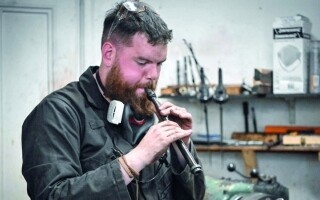
Ruari Black is one of the last masters of handmade Scottish bagpipes in the historic center of Edinburgh, known for preserving the craft, which is under threat of extinction. "We are one of the last hand producers in Edinburgh, possibly even in the world," notes Ruari during the process of forming the pipes on a lathe, indicating that the sound of this bagpipe is unique.
The bagpipe is an important part of Celtic culture and the history of the Scottish Highlands. This instrument, known for its powerful sounds, was used significantly even in the 20th century to support the fighting spirit of Scottish soldiers in battlefields, including on the Normandy beaches during World War II.
After the pipes are shaped and constructed, the master prepares them with mounts and rings, performs final touches, and installs various components, fixing them in place. After completing this process, the bagpipe produces "our unique sound, unmatched by anything else," confirms Ruari Black, who joined the Kilberry masterclass in 2019 for professional training.
This attracts clients from all over the world, who are willing to pay between £1,200 and £6,000 (between $1,560 and $7,800) for a traditional Scottish bagpipe in the Highlands region. "They need this sound, which we strive to preserve so dearly," emphasizes Ruari Black.













